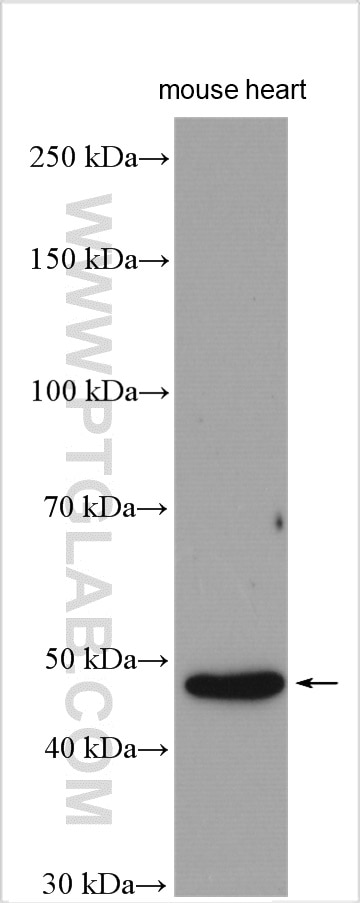Validation Data Gallery
Tested Applications
| Positive WB detected in | mouse lung tissue, mouse heart tissue |
Recommended dilution
| Application | Dilution |
|---|---|
| Western Blot (WB) | WB : 1:1000-1:4000 |
| It is recommended that this reagent should be titrated in each testing system to obtain optimal results. | |
| Sample-dependent, Check data in validation data gallery. | |
Published Applications
| KD/KO | See 1 publications below |
| WB | See 1 publications below |
| IF | See 1 publications below |
Product Information
28422-1-AP targets ILT-3/LILRB4 in WB, IF, ELISA applications and shows reactivity with Human, mouse samples.
| Tested Reactivity | Human, mouse |
| Cited Reactivity | mouse |
| Host / Isotype | Rabbit / IgG |
| Class | Polyclonal |
| Type | Antibody |
| Immunogen | ILT-3/LILRB4 fusion protein Ag28928 相同性解析による交差性が予測される生物種 |
| Full Name | leukocyte immunoglobulin-like receptor, subfamily B (with TM and ITIM domains), member 4 |
| Calculated molecular weight | 448 aa, 49 kDa |
| Observed molecular weight | 49 kDa |
| GenBank accession number | BC026309 |
| Gene Symbol | LILRB4 |
| Gene ID (NCBI) | 11006 |
| RRID | AB_3086050 |
| Conjugate | Unconjugated |
| Form | Liquid |
| Purification Method | Antigen affinity purification |
| UNIPROT ID | Q8NHJ6 |
| Storage Buffer | PBS with 0.02% sodium azide and 50% glycerol , pH 7.3 |
| Storage Conditions | Store at -20°C. Stable for one year after shipment. Aliquoting is unnecessary for -20oC storage. |
Background Information
LILRB4 is an inhibitory receptor in the LILR family mainly expressed on normal and malignant human cells of myeloid origin. LILRB4 is activated and subsequently recruits adaptors to cytoplasmic immunoreceptor tyrosine inhibitory motifs to initiate different signaling cascades, thus playing an important role in physiological and pathological conditions, including autoimmune diseases, microbial infections, and cancers.
Protocols
| Product Specific Protocols | |
|---|---|
| WB protocol for ILT-3/LILRB4 antibody 28422-1-AP | Download protocol |
| Standard Protocols | |
|---|---|
| Click here to view our Standard Protocols |
Publications
| Species | Application | Title |
|---|---|---|
Cancer Immunol Immunother NLRP12/C1qA positive feedback in tumor-associated macrophages regulates immunosuppression through LILRB4/NF-κB pathway in lung adenocarcinoma
|

